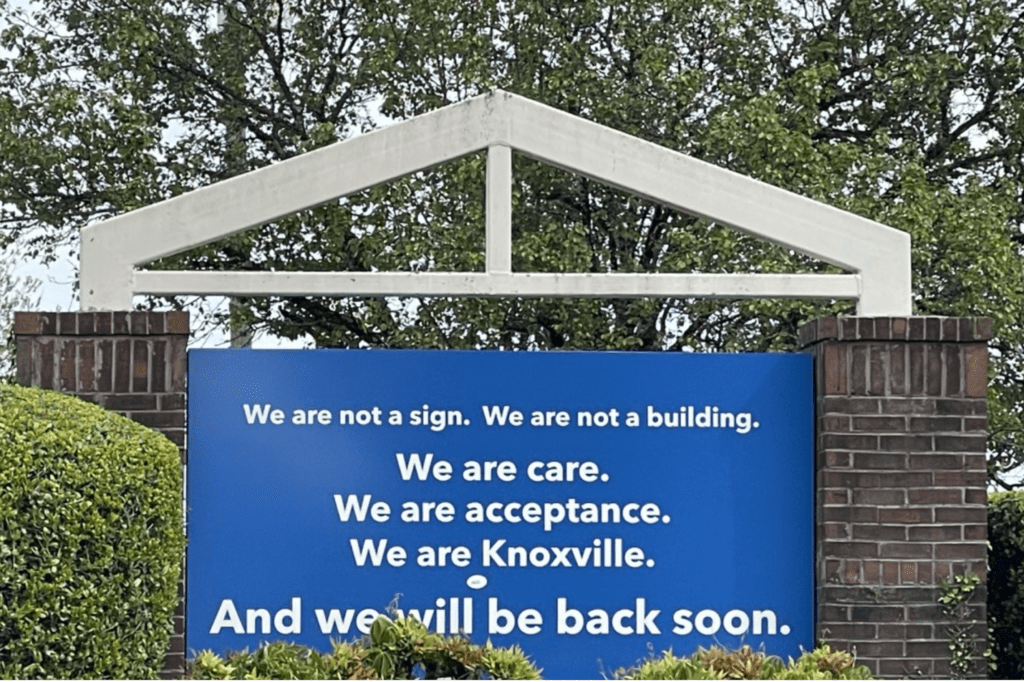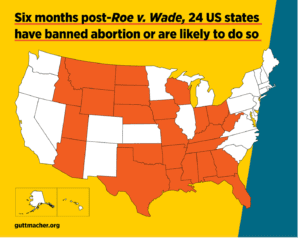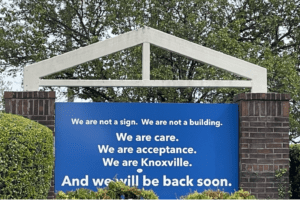News analysis: The abortion case leak, one year later

Planned Parenthood sign at former Knoxville location, which was destroyed by arson.
(Editor’s Note: This news project was the work of two sections of spring semester 2023 Multimedia Reporting sections at the University of Tennessee, Knoxville, School of Journalism and Media. Individual reporters are listed in parentheses at the end of each of four sections. Professor Mark Harmon was the project editor.)
May 2, 2023, marks one year since the leak of the U. S. Supreme Court decision, Dobbs v. Jackson Women’s Health Organization, overturning a federal right to abortion. The article in Politico sent shockwaves through the worlds of politics and reproductive health, and the massive legal changes started with the Supreme Court’s formal release of the decision on June 24, almost identical to the earlier draft. The intervening year has seen upheavals on several fronts — the operation and reputation of the Supreme Court, the possibility of changes to other previously recognized rights grounded in privacy, the care available to persons facing unintended or problem pregnancies, and future political clashes in multiple locations over issues involving abortion.
The Court: Leak Never Found, and Public Trust Slumping
Justice Samuel Alito was the author of the Dobbs v. Jackson Women’s Health Organization decision (2022) that overturned both Roe v. Wade (1973) and Planned Parenthood v. Casey (1992), cases finding in constitutional privacy law a right to abortion. Alito decried the leak of the Dobbs draft as a “grave betrayal of trust by somebody.” Speaking at a conservative Heritage Foundation event, Alito said the leak also put at risk the lives of conservative justices presumed to be in the majority who could be targets for political assassination. The Court’s internal probe of the leak failed to identify the source.
“Between the leak and the final release, there were a few changes in Dobbs ‘ opinion, but not much was different,” said Hemant Kumar Sharma, professor of political science, University of Tennessee. “We may never know who leaked this draft unless they decide to come forward one day.”
Mike Martinez, assistant professor of practice in the University of Tennessee’s School of Journalism and Media, teaches the mass media law course. He sees the leak as agenda-driven.
“What happens when the justices start trying to make a decision, there is a lot of negotiations among the nine justices, whether they are going to sign on the majority of the opinion,” Martinez explained. “What happened when they leaked this, all of that room for negotiation got locked into place. The decision wasn’t going to come out for another couple of months, so at the point of the leak, it wasn’t even finalized, but nobody could change their decision.”
UT law professor Benjamin Barton said, “This sort of leak is very unusual in the history of the Court and I thought it was a terrible look all around. Public confidence in the Court is already plummeting and to have a full draft opinion leak only makes that worse. And then the understandably long investigation came up completely empty, only fueling the fires of conspiracy theories. Overall, it was a sad day for the Court.”
A recent Marist Poll found only 37% of Americans report a great deal (15%) or a quite a lot (22%) of confidence in the U.S. Supreme Court, the lowest degree of Court confidence from Americans since that poll first asked the question in 2018, and tumbling 22 percentage points since then. Currently, more than six in ten Americans (62%) say they have not very much (39%) or no confidence at all (23%) in the United States Supreme Court.
(Section reporting by: Bryan Cross, Alexie Cowan, Gabriel Knight, Benjamin Frey, Bret Wood, and William Ohlig)
Shuffling the Deck on Privacy-Themed Precedents
Julie F. Kay, a human rights lawyer, which may be similar to those from london solicitors, who has argued abortion cases before courts internationally, said she was shocked by the Dobbs decision. “I mean we’re talking about overturning 50 years of precedent, using a constitutional kind of text argument that they [the Court majority] thought was really false,” she said. “To me, this is a human right control your own decision about whether, when and whom to have a child with.”
Casey and Roe were overturned on the determination that abortion is not a constitutional right and that abortion is not an issue deeply rooted in the nation’s history. Justice Alito’s majority opinion declared that the 14th Amendment, the amendment on which Roe was decided, only applied to rights that were deeply rooted in the nation’s history. Absent a federal constitutional concern, the issue was left to the states.
The decision to overturn Roe v. Wade led to rapid change in state and national laws regarding reproductive rights and abortion. Twelve states have issued a near-total ban on abortions. Several states have implemented a gestational-age ban on abortion. States with these bans restrict abortion to a specified week of pregnancy.
For Stacy Dunn, Director of Knox County’s Chapter of Tennessee Right to Life and President of Tennessee Right to Life, the Court ruling was a moral imperative. “The overturning of Roe v. Wade was inevitable. It is tragic that it took almost 50 years and more than 60 million lives lost before it happened,” she said. “The Supreme Court finally confirmed what we have known all along – Roe was wrongly decided because there is no right to abort unborn children in the U.S. Constitution. It doesn’t exist. The Dobbs decision returned the responsibility of protecting unborn children to the states and, in Tennessee, our legislators were poised to do just that.”
The Tennessee Trigger Bill went into effect in August 2022, which made performing an abortion a felony according to Tennessee state law. “The bill was only a page and a half long and it wasn’t very detailed , but it has some very consequential aspects to it,” Tennessee State Senator Richard Briggs said.
According to the trigger bill, the only exceptions are made when an abortion would prevent death of the pregnant woman or “substantial and irreversible impairment of a major bodily function.” An abortion provider must provide proof that an abortion met the criteria for an exception.
Dunn takes a hardline against modifying Tennessee’s law for any other exceptions. “The protection of the law in Tennessee applies to all unborn children, no matter the conditions of their existence,” she stated. “Rape and incest are horrible crimes. A woman or girl who has been assaulted should be given everything possible to help her cope and heal and every assistance in bringing the assailant to justice. The assailant is a criminal who should face punishment, but the unborn child is not a criminal…Aborting a child is not a ‘treatment’ for rape or incest,” Dunn said.
Briggs, a medical doctor and pro-life Tennessee state senator, believes he has a responsibility as a physician to fight for abortion rights in cases where an abortion needs to take place for various medical reasons he calls “medically futile pregnancies.” He had partial success in the legislative session just completed, winning only a clarification that terminating an ectopic or molar pregnancy does not constitute criminal abortion.
“Right to Life came down on me like a sledgehammer,” Briggs said. He says he will continue his efforts, step by step. “If you ask for too much, you may get nothing,” Briggs said.
“The basic legal question is does this state have enough of an interest in the conduct or the pregnancy or the fetus such that they can take criminal jurisdiction,” said Wendy Bach, University of Tennessee law professor. “The other basic criminal law question is ‘Did the person act in [ways the state has criminalized such as] medications mailed to the state? Did they take an abortion medication inside the boundaries of the state?’ Those are all really complicated legal questions that are going to play out,” she said.

Several states have enacted proactive abortion policies. Seven states, including California and New York, have provided funding to support abortion clinics and services. Many states have passed legislation to support access to abortion clinics. New Mexico plans to build a clinic near the Texas border to provide access for those in Texas and Oklahoma, where there are near-total bans. Fourteen states have adopted shield laws, protecting in-state abortion providers and helpers in states where abortion is legal from civil and criminal consequences from providing abortions to out-of-state residents.
Supreme Court Justice Alito’s majority opinion suggests that the Dobbs decision reach is limited to the right to abortion. “Nothing in this opinion should be understood to cast doubt on precedents that do not concern abortion,” he wrote.
According to Justice Alito, no other Supreme Court decisions rooted in substantive due process are in danger of being overturned. Substantive due process interprets the Fifth and Fourteenth amendments’ due process clauses as protecting essential rights that aren’t explicitly mentioned in the United States Constitution.
Both Justices Stephen Breyer (now retired), Sonia Sotomayor, and Elena Kagan’s dissenting opinion and Justice Clarence Thomas’s concurring opinion disagree with Alito’s claim of limited precedent. “Either the mass of the majority’s opinion is hypocrisy, or additional constitutional rights are under threat,” the dissenting justices wrote. Justice Thomas was willing, however, to reconsider whether to recognize those additional substantive due process rights.
Other rights rooted in substantive due process include interracial marriage, same-sex marriage, and the use of birth control.
(Section reporting by: Hayden Formica, Fulton Myrick, Griffin Hadley, Colby Goins, Sydnie Ailey, Michael Padrta)
Threats to the Pregnancy Care and Choices
Dr. Jan Hahn, a family physician in Lenoir City who studied and practiced obstetrics for 15 years, believes obstetricians and gynecologists will not move to states that impose bans or severe restrictions on abortion.
“This debate is not about women’s care; it is about who gets to control a woman’s body – she alone, or a man,” Hahn said. He has observed that abortion bans do not affect the number of unplanned pregnancies; those remain constant.
Hahn says he has seen problems with state abortion bans already, as women only will have to travel greater distances to get abortion care. “Many counties lacked obstetrical care within their borders forcing even women with adequate financial resources to travel long distances to distant cities. Obstetrical problems that could have been treated quickly and efficiently now progressed to severe degrees of danger,” said Hahn.
“Many women, without access to competent obstetrical care, continued their misuse of drugs and alcohol. These women experienced complex and problematic deliveries and produced babies saddled with an overwhelming number of issues.”
Tennessee’s allowance for an “affirmative defense” for abortion providers is insufficient protection for doctors, according to Hahn. “You first have to do an abortion to save a woman’s life, and then your charged with a felony murder and you have to prove that you committed a felony murder to save the woman’s life,” he noted.
One analysis of mortality numbers, published in Demography magazine in 2021, projected that following a total ban on induced abortions the U. S. would see a 7% increase in maternal deaths in the first year, and 21% in subsequent years.
Seema Mohapatra, who teaches at Southern Methodist University’s Dedman School of Law where she is a health law professor focusing on equity, health justice and access to reproductive health care. She attended a recent University of Tennessee Law School Symposium and declared we “need to frame [the questions] as a health justice issue in a post-Dobbs world.”
As an abortion right no longer is recognized, argued Mohapatra, conservative Republican women also face dangers and adverse consequences. These adverse consequences are going to be worse in restrictive states, especially for Black women. We need to offer social support. For example, if we advocate contraception, then we need to make it available in a non-judgmental setting.
“Lawmakers make decisions about pregnant persons’ lives with no input from those persons,” Mohapatra lamented.
“We know the harm that has come from this [Dobbs] decision,” said Ashley Coffield, chief executive officer of Planned Parenthood of Tennessee and Northern Mississippi. “We know that it will impact Black, Latino, and other people of color who already disproportionally feel the effects of abortion bans and restrictions. This is all a product of this country’s legacy of racism and discrimination. Eliminating the right to an abortion has and will have serious life-and-death consequences. We need to fight like hell to defend their lives,” she said.
(Section reporting by: Faith Applewhite, Julia Peteros. Maclyn Boals, Lily Van Alsburg, John Wolff, Lauren Starcke, Amanda Simpson)
The Likely Abortion-Related Clashes Coming Soon
During an April meeting of the University of Tennessee Knoxville’s chapter of Planned Parenthood Generation Action, some of the group’s leaders reflected on the pre-Dobbs environment and what they now must do in the post-Dobbs environment.
“People were comfortable because [abortion] seems like this human right, right? This seems like it’s something that we had and we were going to have forever,” recalled Allie Farley, a junior gender studies major and president-elect of the group, “You can see how easily women’s rights and people’s rights can be stripped as a result of political tampering … and injustice.”
The UT chapter has plans for advocacy, outreach, and possibly free distribution of Plan B “morning after” emergency contraception, pills that can prevent pregnancy by delaying ovulation, and works best if taken within 72 hours after unprotected sex.
Nicky Skinner, Planned Parenthood’s East Tennessee community organizer, spoke to the group about the local Planned Parenthood’s new mobile health clinic. It has a waiting area and enough space for two patients in two different rooms at any one time. “That clinic, although obviously we cannot provide abortion services in Tennessee anymore for now, although we refuse to accept that as our new normal, we are still able to offer other family planning services. We’re able to offer gender-affirming care from the mobile health unit, STI [Sexually Transmitted Infections] testing and all of the other services that Planned Parenthood has always provided,” Skinner said.
Planned Parenthood’s previous Knoxville clinic burnt to the ground on the last day of 2021. Authorities say the fire was started by Mark Reno, 64, a Jefferson City man who had previously attacked the building, was involved in a shooting attack at a federal building, and was being investigated for his actions in the January 6th insurrection at the U. S. Capitol. He died in custody in August 2022.
Knoxville’s Director of Community Safety Lakenya Middlebrook believes the city can join with Planned Parenthood and other groups to assure proper healthcare for pregnant women in Tennessee. “We try to make sure we are being a good partner through grants and promoting access to proper healthcare.” she said.

Religion has played a strong role in many aspects of clashes regarding abortion. East Tennessee pastor Matt Vairetta could be characterized as pro-life, and views abortion as a complex, sensitive and heated topic that has been the subject of intense political debate for decades. He believes that the issue has become over-politicized, often overshadowing the needs of women at the center of the conversation.
“I think the church should view this issue with less focus on voting and more about how the church can come around young mothers, women experiencing an unplanned pregnancy, and vulnerable children,” said Vairetta.
He believes there’s a middle ground for this issue that is overlooked the extremes on both sides seem unwilling to work together. The local pastor discussed examples of both sides working together by communities donating time and money to support adoptive parents and birth mothers in the adoption process. He emphasized the idea of advocating for support networks and health care for birth moms who feel alone in their reproductive journey.
The Rev. Chris Buice of Tennessee Valley Unitarian Universalist Church takes a pro-choice position.
“There needs to be a fine line where law does not interfere with medicine,” he said. “I’ve known people who have had to have an abortion because of complication with their pregnancy and would have died otherwise. So, seeing situations like that makes you think that there are some instances where abortion can be necessary in a way. I also believe, as a religious leader, that people in power should not try to impose your views on others. That is exactly what they [the Court] did with the overturning of Roe v. Wade.”
“In a lot of conservative fundamentalist churches, they silence the women in the congregation, not allowing them to have leadership roles. This is why I think a lot of churches are pro-life because not only do they interpret the Bible that way, but they also don’t have women in leadership roles to lend their opinion to the congregation on certain issues that have to do with female autonomy,” Buice said.
While disputes within and between congregations likely will continue, many immediate abortion-related clashes will play out both within and between state governments. Tennessee Right to Life advocates, for example, successfully pushed a bill that prohibits local governments from using tax dollars to fund or reimburse expenses for abortions performed in another state. Elections and ballot referendums also will influence the future legal environment. Pro-choice congressmen also are pushing for protection of abortion rights by making the provisions of Roe into a federal statute, while pro-life congressmen have several proposed laws crafting national bans on abortion.
(Section reporting by: Ashley Nugent, Lyndsey Summers, Cade Beasley, Klaryssa DeLaCruz)


